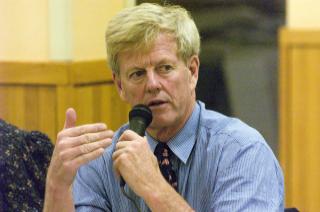A major wind turbine development near the Vineyard is at best a stopgap measure, and the real energy future lies in federal waters, state energy and environmental officials told Islanders this week.
“The state’s interest, long-term is not in state water,” Deerin Babb-Brott, one of the senior bureaucrats driving the state oceans plan, told local community leaders at a public meeting at the regional high school Wednesday night. The interest is in federal water, at the extreme limit of visibility, or completely over the horizon, he said.

